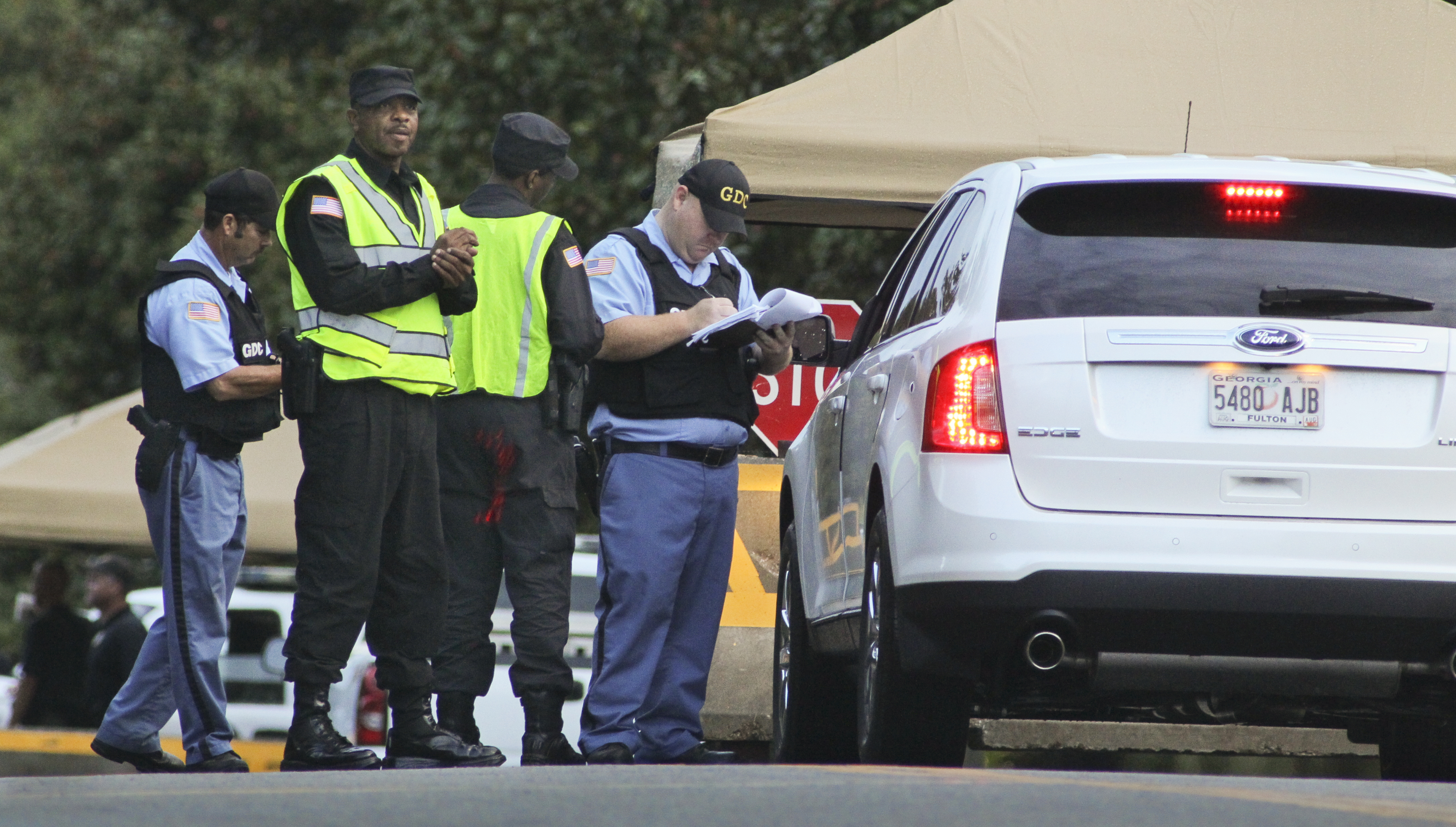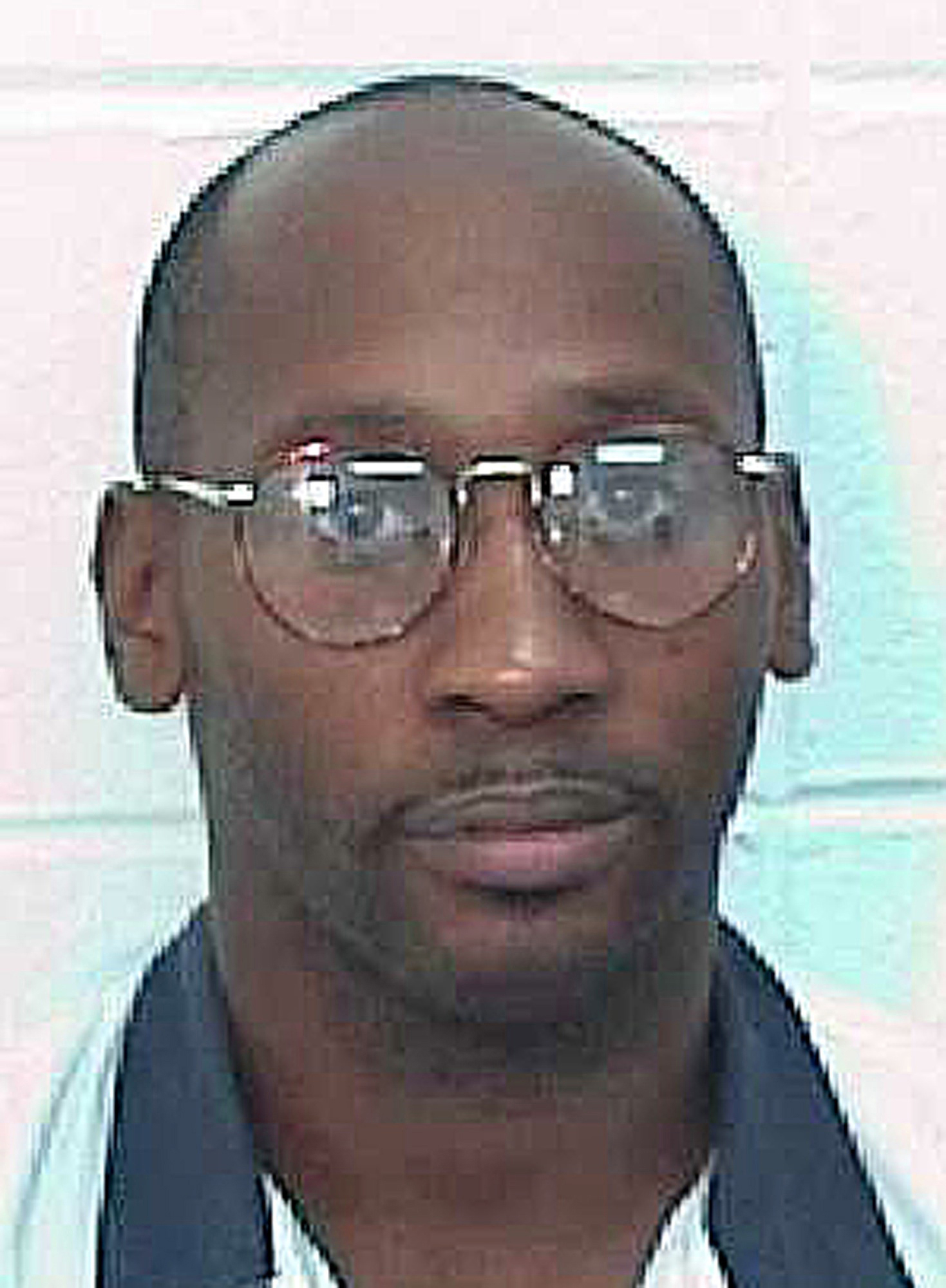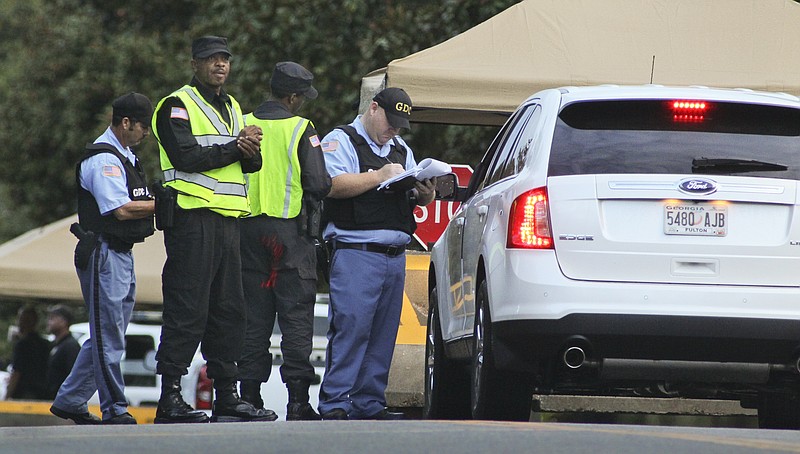 Lawyers for Troy Davis, Stephen Marsh and Danielle Garten, in car, are turned away at the Georgia Diagnostic Prison Wednesday, Sept. 21, 2011 as they tried to gain access to give a polygraph test to Troy Davis before he is scheduled to be executed Wednesday night. Davis, who has always maintained his innocence, sits on death row for the 1989 murder of off-duty Savannah Police Officer Mark Allen MacPhail. Supporters of Davis are urging Savannah's top prosecutor to intervene with just hours to spare before Davis' scheduled execution.(AP Photo/Atlanta Journal-Constitution, John Spink)
Lawyers for Troy Davis, Stephen Marsh and Danielle Garten, in car, are turned away at the Georgia Diagnostic Prison Wednesday, Sept. 21, 2011 as they tried to gain access to give a polygraph test to Troy Davis before he is scheduled to be executed Wednesday night. Davis, who has always maintained his innocence, sits on death row for the 1989 murder of off-duty Savannah Police Officer Mark Allen MacPhail. Supporters of Davis are urging Savannah's top prosecutor to intervene with just hours to spare before Davis' scheduled execution.(AP Photo/Atlanta Journal-Constitution, John Spink)ATLANTA - With less than half a day left to live, Troy Davis' supporters in the U.S. and Europe were trying just about anything Wednesday to win his clemency for killing a Georgia policeman, a crime he and others have insisted for years that he did not commit.
Supporters planned vigils around the world. They'll be outside Georgia's death row prison in Jackson and at U.S. embassies in Europe.
The 42-year-old's most realistic, though slim, chance for reprieve is through the courts, and his lawyers are trying. His backers also have resorted to far-fetched measures: offering for Davis to take a polygraph test, urging prison workers to strike or call in sick, posting a judge's phone number online, urging people to call and ask him to put a stop to the 7 p.m. execution. They've even considered a desperate appeal for White House intervention.
Supporters include former President Jimmy Carter, Pope Benedict XVI and a former FBI director, the NAACP, as well as conservative figures. The U.S. Supreme Court even gave him an unusual opportunity to prove his innocence last year.
Still, prosecutors have backed the guilty verdict and state and federal courts have repeatedly upheld his conviction for killing Savannah officer Mark MacPhail in 1989. Several judges have listened to recanted testimony from witnesses and to jurors who say they would change their verdicts, knowing the facts revealed later.
MacPhail was off-duty working security at a bus station on Aug. 19, 1989, and rushed to the aid of Larry Young, a homeless man that prosecutors say Davis was bashing with a handgun after asking him for a beer. When MacPhail got there, they say Davis had a smirk on his face as he shot the officer to death in a Burger King parking lot. Others have claimed the man with him that night has said he actually shot the 27-year-old officer.
 This undated file photo provided by the Georgia Department of Corrections shows death row inmate Troy Davis. Georgia corrections officials have scheduled a Sept. 21, 2011, execution date for Davis, for the 1989 murder of Savannah police officer Mark MacPhail. Davis, now 42, insists he's innocent and his lawyers, arguing they could prove it, have managed to spare him from three execution dates in the last four years. (AP Photo/Georgia Department of Corrections, File)
This undated file photo provided by the Georgia Department of Corrections shows death row inmate Troy Davis. Georgia corrections officials have scheduled a Sept. 21, 2011, execution date for Davis, for the 1989 murder of Savannah police officer Mark MacPhail. Davis, now 42, insists he's innocent and his lawyers, arguing they could prove it, have managed to spare him from three execution dates in the last four years. (AP Photo/Georgia Department of Corrections, File)As time ticked toward the execution, an upbeat and prayerful Davis turned down a last meal and planned to spend his final hours meeting with friends, family and supporters. Meanwhile, two attempts to prove his innocence were rejected: a polygraph test and another hearing before the pardons board.
His attorney Stephen Marsh said Davis would only submit to a polygraph test if pardons officials would consider it.
"He doesn't want to spend three hours away from his family on what could be the last day of his life if it won't make any difference," Marsh said.
His lawyers, meanwhile, are trying the legal avenues left to them, filing a motion in a county court challenging the ballistics evidence and eyewitness testimony. A judge could at least delay the execution, which has happened three times before. Most believe arguments on the merits of the case have been exhausted, however.
President Barack Obama also could ask the Justice Department to look at the case, but the NAACP has yet to make that request and legal experts have said it's unlikely he'd step in.
In Savannah, 16 Davis supporters gathered at the Chatham County courthouse to press District Attorney Larry Chisolm to help stop Davis' execution. They said 240,000 people had signed petitions urging the state to spare Davis' life, and delivered them in three large boxes to Chisolm's courthouse office where they were received by a member of the prosecutor's staff. Chisolm has said he's powerless to intervene, but activists say they believe he has enough influence as district attorney to sway the outcome.
As for the new and changed accounts by some witnesses, a federal judge dismissed them, saying that while the "new evidence casts some additional, minimal doubt on his conviction, it is largely smoke and mirrors" after a hearing Davis was granted last year to argue for a new trial to the U.S. Supreme Court, the first time justices had considered it for a death row inmate in at least 50 years. It failed.
Prosecutors have no doubt they charged the right person, and MacPhail's family lobbied the pardons board Monday to reject Davis' clemency appeal. The board refused to stop the execution a day later.
"He has had ample time to prove his innocence," said MacPhail's widow, Joan MacPhail-Harris. "And he is not innocent."
In Europe, where the planned execution has drawn widespread criticism, politicians and activists were making a last-minute appeal to the state of Georgia to refrain from executing Davis. Amnesty International and other groups planned a protest outside the U.S. Embassy in Paris later Wednesday and Amnesty also called a vigil outside the U.S. Embassy in London.
Parliamentarians and government ministers from the Council of Europe, the continent's human rights watchdog, called for Davis' sentence to be commuted. Renate Wohlwend of the Council's Parliamentary Assembly said that "to carry out this irrevocable act now would be a terrible mistake which could lead to a tragic injustice."
The U.S. Supreme Court gave him an unusual opportunity to prove his innocence last year, but his attorneys failed to convince a judge he didn't do it. State and federal courts have repeatedly upheld his conviction.
Spencer Lawton, the district attorney who secured Davis' conviction in 1991, said he was embarrassed for the judicial system that the execution has taken so long.
"What we have had is a manufactured appearance of doubt which has taken on the quality of legitimate doubt itself. And all of it is exquisitely unfair," said Lawton, who retired as Chatham County's head prosecutor in 2008. "The good news is we live in a civilized society where questions like this are decided based on fact in open and transparent courts of law, and not on street corners."
The motion filed in Butts County Court disputes testimony from a ballistics examiner who claimed that the bullets fired in a previous shooting that Davis was convicted of may have come from the same gun that fired at MacPhail. And it challenged eyewitness testimony from Harriet Murray, a witness who claimed at the trial to have identified Davis as the shooter.
It asks the court to vacate Davis' execution, or at least delay it by 90 days, on grounds that it was "based on false, misleading and materially inaccurate evidence."
Witnesses placed Davis at the crime scene and identified him as the shooter. Shell casings were linked to an earlier shooting that Davis was convicted of. There was no other physical evidence. No blood or DNA tied Davis to the crime and the weapon was never found.
